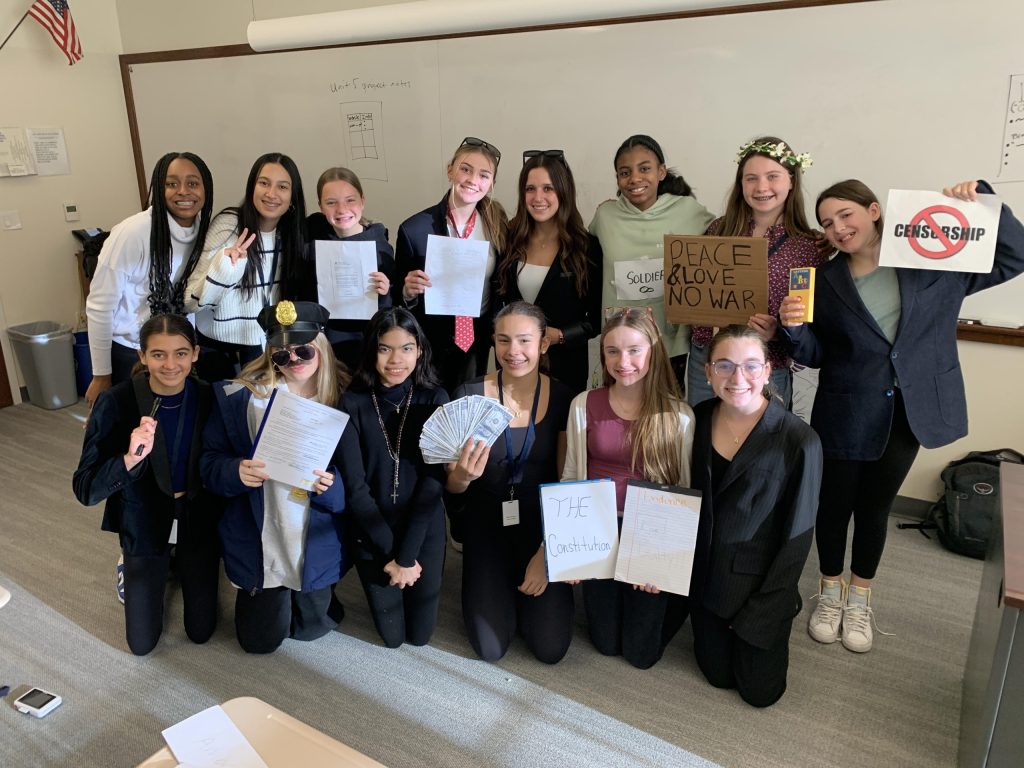Embodying the Bill of Rights
 Students in Erin Traynor’s grade 8 history class, Related U.S. Topics, have been studying the importance and legacy of the Bill of Rights. In addition to taking a deep dive into each amendment, they also learned that in 1941, President Roosevelt declared December 15 annual Bill of Rights Day to commemorate the date the Amendments were ratified in 1791. On Bill of Rights Day, the nation celebrates the fundamental freedoms enshrined in those first 10 Amendments to the Constitution and commemorates their importance to our democracy.
Students in Erin Traynor’s grade 8 history class, Related U.S. Topics, have been studying the importance and legacy of the Bill of Rights. In addition to taking a deep dive into each amendment, they also learned that in 1941, President Roosevelt declared December 15 annual Bill of Rights Day to commemorate the date the Amendments were ratified in 1791. On Bill of Rights Day, the nation celebrates the fundamental freedoms enshrined in those first 10 Amendments to the Constitution and commemorates their importance to our democracy.
Last week, in homage to Bill of Rights Day, students in Traynor’s class chose an amendment to physically embody and dressed accordingly. As they made their way around campus, faculty and students were encouraged to ask them about their chosen amendment and why they selected it.
“As we have just finished our unit on the Bill of Rights, this was a timely opportunity for the students to apply their understanding creatively,” noted Traynor. “As young citizens and future voters, it is essential for them to know their rights and understand why and how they are protected. By celebrating these freedoms in a fun and engaging way, I hope these young women will be inspired to actively participate in preserving justice for all people.”
Alex Sherman ’28 chose to represent the Sixth Amendment, which deals with the right to a fair trial.
“I chose to dress as a lawyer because my mom is a lawyer,” Sherman shared. “She represents how women can play a strong role in the legal system and Congress.”
Her classmate, Isabella Conte ’28, agreed and also dressed as a lawyer to represent the Sixth Amendment.
“I think being a lawyer is an important career option for a girl — especially because girls can do anything in the world now,” said Conte.
Olivia Crossman ’28 and Ambra Ascioti ’28 opted for the First Amendment and dressed as journalists to represent freedom of the press.
“I place a high value on freedom of the press because I want to be a journalist when I get older,” said Crossman.
Ascioti added, “I chose to be a journalist because we learned about an interesting Supreme Court case regarding censorship and a journalist who criticized the government.”
For Cairah Chester ’28, her choice of Amendment was a matter of convenience. “I have a pair of fatigues, so I chose the Third Amendment, which states that a soldier can’t be quartered or go into another person’s home without their permission.”
Related U.S. Topics explores the historical and philosophical foundations of the United States, including structures and operations of the three branches of government. As the year progresses, the course expands to include the principles of civic participation, foreign policy, and economics.






